Visit puts Azerbaijan on the map
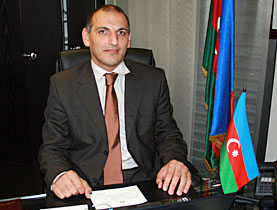
Switzerland plays host from Sunday to the leader of one of the world's oldest oil producers, but one which is relatively little known to the Swiss population.
Azerbaijan President Ilham Aliyev is paying an official visit, expected to focus on economic issues. But the unresolved conflict between Azerbaijan and neighbouring Armenia could also be raised within the context of Swiss mediation in the southern Caucasus.
Azerbaijan’s ambassador to Switzerland, Elchin Amirbayov, told swissinfo.ch that President Aliyev’s visit is a chance to make his country better known.
Along with his Swiss counterpart, Hans-Rudolf Merz, he will be attending the inaugural concert of a series of Azerbaijani cultural events to be held all over Switzerland in the next six weeks.
swissinfo.ch: What issues are of particular interest between the two countries?
Elchin Amirbayov: I think Switzerland is mainly interested in having Azerbaijan as one of its major partners in terms of energy cooperation.
A second thing is political dialogue, and the role that Switzerland has been playing in the south Caucasus recently, taking over the representation functions between Georgia and Russia and also trying to play a more active role in bringing Turkey and Armenia closer together. There is also its interest in a peaceful resolution of all unresolved conflicts in the region of the south Caucasus, including the conflict between Armenia and Azerbaijan.
In a broader economic field Switzerland is one of the most important countries for Azerbaijan in terms of direct foreign investment into the non-energy related sector.
swissinfo.ch: Are you worried about what seem to be warmer ties between Turkey and Armenia?
E.A.: I wouldn’t say that we are worried by the rapprochement between the two countries, because we only welcome the restoration of stability and security in the broader region.
What matters for us is that this particular bilateral relationship should not be taken out of the context of the whole region. One of the major issues to be tackled in the region in terms of security is the unresolved issue of the occupation by Armenia of almost 20 per cent of Azerbaijan’s internationally recognised territory [Nagorno-Karabakh].
swissinfo.ch: Does Switzerland have anything to teach Azerbaijan in terms of good governance?
E.A.: Switzerland has a long tradition of democratic development. We started this only in 1991, after the collapse of the Soviet Union, and if you take into account the fact that immediately after that we were burdened with this difficult unresolved caseload of occupation, and the Nagorno-Karabakh conflict, you’ll realise that the security issue and the existential issue was a priority.
Since we became members of the Council of Europe in 2001 quite a long way has been covered in trying to establish a basis for political reform, to open up the country, to establish a basis for civil society and democratic norms and principles. Of course the experience of Switzerland which has several centuries of this development is useful to us.
But on a number of issues of international importance – for example climate change, energy security, unresolved security issues in the area – I think it would be worthwhile for Swiss parliamentarians to visit our country, if they are interested in the outstanding challenges facing European security.
swissinfo.ch: Do you think you are succeeding in your aim of making ordinary Swiss people more aware of Azerbaijan?
E.A.: We have only been present in Bern since 2005. And in the last four years we have noticed that at least many people can now pronounce the word! And we have a lot of passers-by who look at the flag and some of them knock at the door and ask where this country is.
The fact that we’ve been able to organise a number of cultural events means people have a chance to decide for themselves what the country is about.
swissinfo.ch: Is President Aliyev worried about being asked about human rights issues in Azerbaijan?
E.A.: I don’t see why he should be worried about that. He has already done a lot, as part of the Azerbaijan delegation to the Council of Europe parliamentary assembly and also as head of state, in trying to integrate Azerbaijan more closely into the European family of nations.
We are very much committed to democratic reforms and human rights issues. We are doing it at our own pace, maybe, but these processes will speed up if we can solve the major issue facing us, the issue of territories being under the control of another state.
swissinfo.ch: What about the case of the so-called “donkey bloggers”?
E.A.: There is an open trial going on. There is one point of view which is defended by certain instances. There is another point of view which thinks those people have violated the law. As long as the trial is going on, it’s difficult for me to comment.
Anyone can follow this trial, and I hope this issue will find a resolution and we shall leave it behind.
I think that when you talk about the bilateral relationship between Switzerland and Azerbaijan there are many more issues on a more important scale. The issue of respect and the promotion of human rights and liberties is always on the agenda, not only between us and others, but it’s also an internal issue in Azerbaijan and President Aliyev himself is very much committed to this cause.
Julia Slater, swissinfo.ch
Azerbaijan is one of three former Soviet republics in the southern Caucasus.
It became independent in 1991.
Simmering unrest in the southwestern enclave of Nagorno-Karabakh, which had a majority Armenian population, turned into war in 1992, ending in de facto secession in 1994. Up to a million people were forced to flee their homes.
Most of the displaced were Azeris driven out of Nagorno-Karabakh, but many Armenians living in Azerbaijan also fled.
Azerbaijan has a population of 8,832,000; the capital and largest city is Baku.
Its oil industry dates back to the early 19th century.
President Aliyev assumed office in 2003, succeeding his late father, Heydar Aliyev.
Switzerland recognised Azerbaijan in December 1991, shortly after it became independent.
Switzerland opened a cooperation office in Baku in 2001, and an embassy in 2007.
Azerbaijan’s current ambassador to Switzerland arrived in 2004, but was at first based in Geneva. An embassy was opened in Bern in 2005.
Pascal Couchepin visited Azerbaijan when he was president in 2008; Ilham Aliyev is now making a return visit.
Parliaments in both countries have reciprocal friendship groups, and there have been several exchanges of visits.
The Swiss company EGL is spearheading the Trans-Adriatic Pipeline project, to be built between Greece and Italy to transport natural gas from the Caspian.
The Swiss cement giant, Holcim, through its company Garadagh Cement, has been in operation in Azerbaijan since 1999. It is planning further investment in response to the current construction boom in the country.
The Swiss engineering company, ABB, is another major Swiss business working in Azerbaijan, including in the construction of power systems for industry.
Two youth activists, Emin Milli and Adnan Hajizade, have been detained on hooliganism charges since July 2009.
They claim to have been attacked in a restaurant, but when they complained to the police, they were themselves arrested.
Their trial, which is open to the media, started in September. It has been widely criticised internationally.
Their nickname comes from a satirical video they posted on the internet showing a donkey giving a news conference.
The authorities say the charges are unrelated to their criticism of the government.
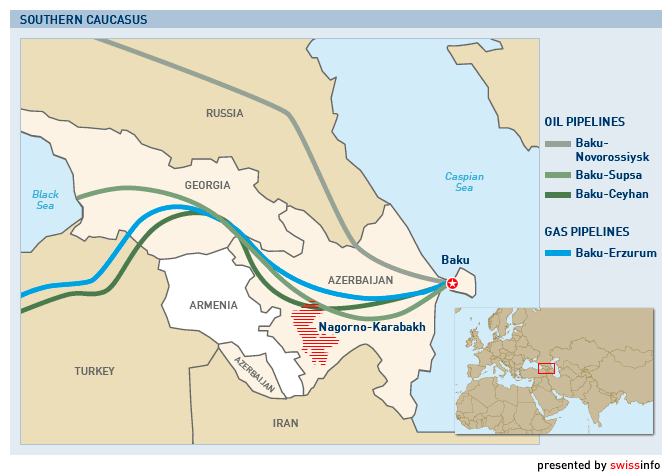

In compliance with the JTI standards
More: SWI swissinfo.ch certified by the Journalism Trust Initiative
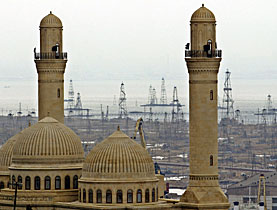
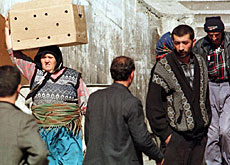
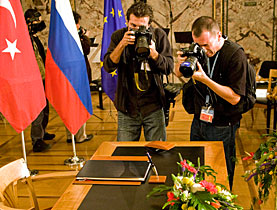
You can find an overview of ongoing debates with our journalists here . Please join us!
If you want to start a conversation about a topic raised in this article or want to report factual errors, email us at english@swissinfo.ch.